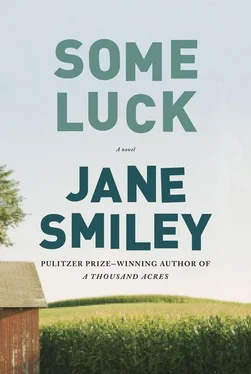No, not when Arthur sat beside her on the couch, holding her hand, and having her recite all the names: Hermann Augsberger, Augustina Augsberger, Otto Vogel, Mary Vogel, Rosanna Vogel, Rolf Vogel, Eloise Vogel Silber, Kurt Vogel, John Vogel, Gus Vogel, Lester Chick, Etta Cheek, Wilmer Langdon, Elizabeth Langdon, Walter Langdon, Frank Langdon, Joseph Langdon, Henry Langdon, Claire Langdon. It didn’t matter that Walter wasn’t yet speaking to her (though Rosanna was), or that Arthur hadn’t met a single one of them yet; these were the relatives, he said, that his son or daughter (Timothy or Deborah) was going to have, and there were scads and scads of them. “Have you ever been lonely, darling?” said Arthur. And Lillian always said, “No.” But of course she was lonely now, except when Arthur was at home. Arthur banished loneliness.
Every evening at six, she could hear him running up the stairs, and then he threw open the door and took her in his arms. He patted her belly and kissed not only her lips but her neck, on both sides, which tickled and made her giddy. Then, while she was setting the table, he sat in his place and told her what had happened that day at the office — two birds had flown in the window, and Arthur had been assigned to get them out, so they opened all the windows, and Arthur ran around with his hat, and then, the most amazing thing, he realized that they were talking, and they had plenty to say. They spoke with something of a French accent, which was surprising, because they were English sparrows — lovely blue color, forked tails — and once Arthur had shown that he was willing to listen to them, they settled on his shoulders as he sat in his desk chair, and told him what they had seen. It was all very important, but, unfortunately, only to birds: the mosquito population is plentiful, but the insects themselves are so small as to be hardly worth eating; there had been a nice harvest of horseflies in Virginia, but every bird in the flock got a little sick afterward; flies outside of grocery stores can be very good; etc. By this time, Lillian was laughing, and Arthur went on earnestly, “I thought they were coming to me — me, Arthur — with information that I could use, but they were just like a couple of blabbermouths on the streetcar, going on and on.”
Lillian played her part. “How did you get them out, though?”
“Well, I simply showed them the door, and said that looks aren’t everything, and they’d have to come back with something worth my time.”
After supper, he helped her with the dishes. He sang songs, like “The Boogie Woogie Bugle Boy” and “People Will Say We’re in Love,” and he got her to sing along. When they listened to the radio, or he read a book or some papers, and she leafed through a magazine, he liked to lay his head in her lap or hold her against him. Just before bed, rain or not, he put her coat on her and walked her outside around the apartment building, once in each direction, “so you won’t get lopsided,” and then they were yawning. In bed, he tucked her up against himself and held her until she fell asleep. She thought it was very lucky that she had slept with so many dolls over the years and so was used to sharing the bed.
But where had he grown up? New England. What did he do all day? So boring, put me to sleep to talk about it. Who was on the phone? No one you know, darling. Was there anyone besides his father that he would like to have over or go out with? No one nearby. He didn’t resent the questions, he just acted like they were impossible to answer, and like she was far more interesting than he was, anyway. It wasn’t until Frankie (Frank!) dropped by on his way home from Europe that she saw even a little of another Arthur.
This Arthur was tougher than she knew. She could see it the moment he opened the door.
But there was Frank. His shoulders had broadened, and his hair and eyes had darkened, and the angles of his face were stark. You would not look at him ever again and say that he was cute. He had the same dazzling smile and the same grace, but he deployed both of them differently than he had — more cautiously, more suddenly. Arthur was clearly struck by him, though Lillian had told him over and over that Frank was a sight to see. Frank was only a couple of inches taller than Arthur, but he looked down on him. It was as simple as that. In the same room with Frank, Lillian felt like she and Arthur were a pair of rabbits. When Arthur stuck out his hand, though, and he and Frank shook, the muscles along the back of his arm flexed. Arthur’s chin even jutted out a little, and his voice deepened as he said, “Welcome back, soldier. I hear you’ve had an interesting four years.”
Frank gave her a big kiss on the lips and ruffled her hair, then actually smacked her on the backside. Lillian decided that he had no idea what he was doing. He sat down at the table while Lillian served him some meatloaf and mashed potatoes from dinner, then a slice of pecan pie. He ate as he always had — meticulously and systematically — and Lillian was surprised she remembered that.
When they went into the living room after dinner and sat down to chat, the thing she noticed was that, after he sat in the armchair (which was fine — they preferred the couch), he adjusted it automatically so that the back of it faced a wall rather than a window and the front faced the door. And when a car backfired while they were talking, he ducked. Of course, being Frank, he sat up at once and said, “Joke’s on me,” and they laughed.
Yes, he had had some odd adventures since V-E Day. Mostly it was beating the bushes for Nazis and herding displaced people here and there — so many had fled from the East that they were camped everywhere, and they were so terrified of being sent back to Poland or Prague or wherever that they could hardly speak. And then there were those, young ones, who didn’t know a thing — could hardly remember who they were, and certainly didn’t know where they were from. Children who had lived in the forest for years, or in a tunnel somewhere, or a bombed-out house. But there were funny ones, too — a fellow they’d run across in the mountains of Austria who wore a towel around his head, looked into a glass ring that he wore on his finger, and went into a trance. When he came out of the trance, he told them the whereabouts of “Germany’s greatest scientist,” or “Germany’s most important invention,” or “the son of Herr Hitler.” Always, these desirables were to be found in the next village over. When a squad went to find them, yes, the building existed, and, yes, a machine existed, but it was a coal stove. The son of Herr Hitler turned out to be forty-two years old — Hitler would have fathered him at the age of fifteen. Of course, it was possible, but Frank somehow didn’t feel the connection. “This guy sent us on six wild-goose chases. Finally, we found a valuable cache — some woman’s collection of fur coats. My buddy Ruben sent the ermine one back to New Jersey as a souvenir.”
Frank was good at telling the stories, and Arthur loved them. Arthur had a story, too, it turned out. Lillian was all ears. Did Frank realize that when the Allies invaded Sicily the Germans thought they were planning to invade Greece? That was why there was no one on the beaches, except to the east.
Frank said, “We were surprised.”
“We played a trick,” said Arthur. “We all helped. We made up a guy, gave him a whole career, a family, papers, ID, monograms, pictures of his dog, ‘Duna.’ The Brits and the OSS talked back and forth about him and how important he was for a year in a code that we knew they had broken before we let his corpse wash up on the beach in southern Greece, and when it did, it was carrying plans for the invasion of Greece, meeting up with the Russians, all kinds of information. When he died, I rather mourned him. We all did. But it worked.”
Читать дальше












